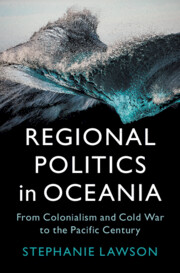Book contents
- Regional Politics in Oceania
- LSE International Studies
- Regional Politics in Oceania
- Copyright page
- Dedication
- Contents
- Preface
- Acknowledgements
- A Note on Sources and References
- Abbreviations
- Maps
- 1 Oceania and the Study of Regions
- 2 Demarcating Oceania
- 3 Colonizing Oceania
- 4 Regionalizing Oceania
- 5 Transformations in Regional Organization
- 6 Regionalism the ‘Pacific Way’
- 7 The Politics of Subregional Identity
- 8 The Forum in Regional Politics
- 9 Democracy and Culture in Regional Politics
- 10 The Spectre of Regional Intervention
- 11 The Political Economy of Regionalism
- 12 Geopolitics in the Pacific Century
- 13 Conclusion
- Select Bibliography
- Index
1 - Oceania and the Study of Regions
Published online by Cambridge University Press: 15 February 2024
- Regional Politics in Oceania
- LSE International Studies
- Regional Politics in Oceania
- Copyright page
- Dedication
- Contents
- Preface
- Acknowledgements
- A Note on Sources and References
- Abbreviations
- Maps
- 1 Oceania and the Study of Regions
- 2 Demarcating Oceania
- 3 Colonizing Oceania
- 4 Regionalizing Oceania
- 5 Transformations in Regional Organization
- 6 Regionalism the ‘Pacific Way’
- 7 The Politics of Subregional Identity
- 8 The Forum in Regional Politics
- 9 Democracy and Culture in Regional Politics
- 10 The Spectre of Regional Intervention
- 11 The Political Economy of Regionalism
- 12 Geopolitics in the Pacific Century
- 13 Conclusion
- Select Bibliography
- Index
Summary
How regions emerge as political, social and economic entities, how they are conceptualized and how they come to provide a basis for identities around which political relations are configured are the major themes of this chapter. It includes an account of the idea of regional society in conceptualizing regional formations as well as attention to the role of area studies in the post-war period of decolonization and the Cold War. Also implicated in the emergence of area studies is the modernization paradigm that continues to underpin ideas about regional development in the global South. The final section addresses the framework for analysis offered by postcolonial approaches and suggests that the lens needs to be adjusted to take account of important instances of non-Western colonialism in Oceania while also offering a more critical perspective on the often taken-for-granted binaries of colonizer–colonized, domination–subordination, and repression–resistance.
Keywords
- Type
- Chapter
- Information
- Regional Politics in OceaniaFrom Colonialism and Cold War to the Pacific Century, pp. 1 - 32Publisher: Cambridge University PressPrint publication year: 2024

